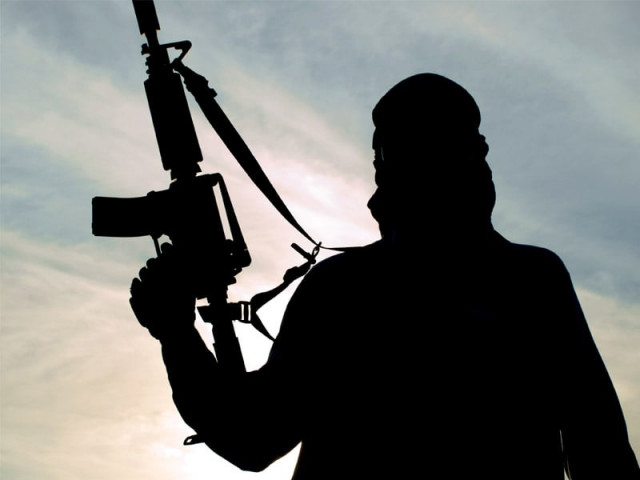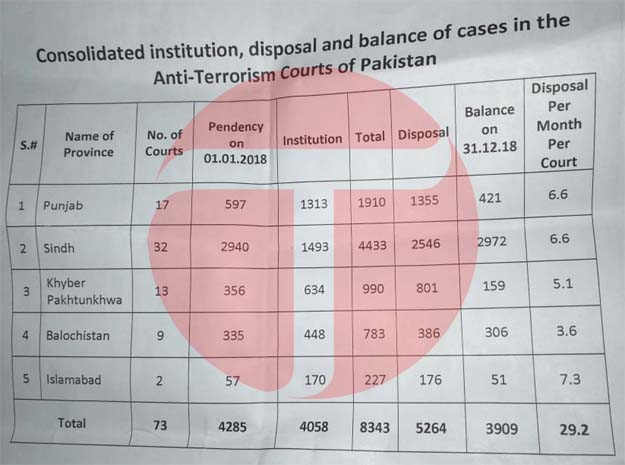4,000 terrorism cases pending in ATCs
Main hurdle in disposing of cases is reluctance of witnesses to testify

Representational image. PHOTO: EXPRESS
The ATCs were established under the ATA, 1997 for speedy trial of cases pertaining to terrorism, sectarian and targeted killings, extortion and kidnapping for ransom.
An ATC is legally bound to decide a case within seven days after indictment.
According to the data available with the Law and Justice Commission of Pakistan (LJCP), 3,909 cases were pending in 73 ATCs until December 31, 2018 while 2,972 cases were only sub judice in 32 ATCs of Sindh.
In Punjab, 1,313 terrorism cases were instituted last year and now the number has decreased to 421.
In Khyber-Pakhtunkhwa, 634 cases were filed in 13 ATCs and now 159 cases are pending.
Likewise, 306 cases are pending in nine ATCs of Blochistan.
Four hundred and forty-eight cases were instituted in Balochistan last year. Only 51 cases were pending in two ATCs of the federal capital till December 31, 2018. One hundred and seventy cases were filed in Islamabad last year.
It is learnt that on average, 29.2 cases are being decided per month in all ATCs.
It is also learnt that same data was presented before Police Reforms Committee (PRC) meeting, which was chaired by Chief Justice of Pakistan Asif Saeed Khosa on Monday.
The meeting was attended by the inspector generals of police from Sindh, Punjab, Khyber-Pakhtunkhwa, Balochistan, Islamabad, Gilgit-Baltistan and Azad Jammu and Kashmir and the Law and Justice Commission of Pakistan (LJCP) secretary.
Insiders revealed that the committee noted that one of the main reasons about the acquittal of suspects in terrorism cases was that witnesses did not step forward to record their statements.

The committee resolved to provide protection to witnesses in such matters.
Likewise, it was emphasised that modern technology would be used to collect evidences in ATC cases. Likewise, ATC judges and staff would also be imparted training.
The committee also urged the Balochistan government to establish a forensic lab. Interestingly, there was no forensic lab in the province.
Earlier, the PRC in its report on the effectiveness of the criminal justice system noted that there was a need for an effective victim and witness protection programme under the act, instead of the status quo position of leaving it to the provinces.
The police and the courts should also be empowered to "take all necessary steps" to ensure that the victims, witnesses, judges, investigation officers and prosecutors were effectively protected during and after terrorism trials.
These steps could involve image and voice distortion, closed sessions, and any other measures considered necessary and expedient in the interest of justice and the protection of witnesses.
The PRC report reveals that a study carried out in K-P for 2015, 2016, and 2017 indicated that, on average, 48 per cent of cases filed by the police under the Anti-Terrorism Act (ATA) and sent to the ATCs were eventually discharged or dismissed by the courts.
Another study highlighted some of the deficiencies of the investigating officers posted in the K-P Counter Terrorism Department (CTD). Most of the investigation officers (IO) posted in the K-P CTD had not received any specialised training in dealing with terrorism investigations of cases, indicating a serious gap in police training programmes in K-P.
Moreover, an overwhelming number of IOs were not even aware of the investigation-related provisions of the Fair Trial Act, which prescribes the legal procedure for IOs to wiretap and intercept terrorists' communications in a manner that the information is admissible in court.
Another study was carried out by a police officer to identify the reasons for acquittal in terrorism cases in Punjab between 1990 and 2009. The study analysed 178 acquittal judgements and broadly identified three reasons – defects in the FIR, flawed investigations, and prosecution problems.
A similar study carried out by another police officer on cases registered under the ATA in Punjab points out the frequent application of ATA to crimes such as gang rape, and mass murder, which, strictly speaking, do not usually fulfil the definition of terrorism.
In fact, the study highlighted that between 2005 and 2011, only 4.6 per cent of cases registered under the ATA in Punjab involved explosives or suicide bombers, the most recognisable form of terrorism.
The same research also indicated that the average conviction rate in ATA cases in Punjab courts during the same period was only 14 per cent.
The PRC notes that after the CJP formed it to give recommendations to the Law and Justice Commission for Police Reforms, a quick survey was conducted. The provincial CTDs were asked to share the latest conviction figures in terrorism cases. It was found that the conviction rate improved in Punjab, going up to 61 per cent in 2016 and 2017, while in K-P it was just 30 per cent, and in Sindh it had gone down to an abysmally low four per cent.
The committee notes that there needs to be a significant improvement in the conviction rate in all the provinces, while also calling on Punjab to share the best practices employed to improve its conviction rate.



















COMMENTS
Comments are moderated and generally will be posted if they are on-topic and not abusive.
For more information, please see our Comments FAQ